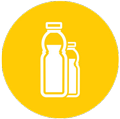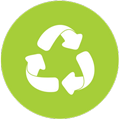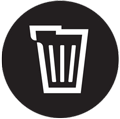About Glass Recycling
Breaking Glass Recycling Barriers, Together
Why Recycle Glass
Glass can be recycled endlessly with no loss in quality or purity. Glass containers returned for recycling help to make new glass bottles and jars (which can include over 95% recycled content), as well as fiberglass. Recycling glass has big environmental payoffs as well—it saves raw materials, lessens demand for energy, and cuts CO2 emissions.

How to Recycle Glass
Follow these simple steps to ensure recyclable glass bottles and jars can become new glass bottles, jars or fiberglass.
- 1. Recycle glass containers only
- 2. Keep it clean: no ceramic cups and plates, drinking glasses, mirrors/window glass, ovenware, or lightbulbs
- 3. Enjoy products in 100% recyclable glass bottles and jars
Whether you use a cart, bin, or drop-off station to recycle, check with your municipality or hauler to determine how glass is recycled in your community. If glass recycling is not available

Glass Recycling
Managing your glass waste disposal processes can be difficult for businesses.
If you’d like to manage it yourself, we’ve laid out everything you need to know here. However, if you’d like to leave it to the experts and focus on growing your business, we can handle everything for you.
Glass recycling, or glass reprocessing, is the process of turning waste glass back into usable products. This involves washing, crushing and melting used glass before moulding it back into bottles and jars. This cycle can be repeated endlessly with no loss in quality to the end product.
Glass manufacturers in the UAE recycle almost 40% of all glass packaging sold, the majority of this figure is made up of glass bottle recycling.

How is glass recycled?
All glass collected separately is brought back to our state of the art Materials Recycling Facility (MRF) for storage. This is then bulked up and transported to a glass treatment plant.
The glass goes through a pre-treatment process which removes any paper or plastic using blown air. Any metal objects are removed with magnets.
Next, it is sorted by colour and washed to remove any further impurities.
Then it’s crushed, melted and moulded into new products such as bottles and jars. A highly versatile material with almost limitless applications; it makes complete sense to recover as much glass as practically possible.
Glass does not degrade through the recycling process so it can be recycled again and again.
This is one of the most efficient forms of recycling of any type of commercial waste, with almost 100% recovery of the original material in an extremely clean and pure form, with fantastic environmental benefits.

Glass that can be recycled:
Bottles and jars are 100% recyclable, and can be recycled again and again, without any loss of quality, but there are other types of glass products which are manufactured through a different process, and can cause problems if they’re put into the recycling process. These are listed here below.
Glass that can’t be recycled:
Light bulbs, windows, mirrors, Pyrex baking dishes, fluorescent lighting tubes.